
Liberia, officially the Republic of Liberia, is a country on the West African coast. It is bordered by Sierra Leone to its northwest, Guinea to its north, Ivory Coast to its east, and the Atlantic Ocean to its south and southwest. It has a population of around 5 million and covers an area of 43,000 square miles (111,369 km2). The country's official language is English; however, over 20 indigenous languages are spoken, reflecting the country's ethnic and cultural diversity. The capital and largest city is Monrovia.
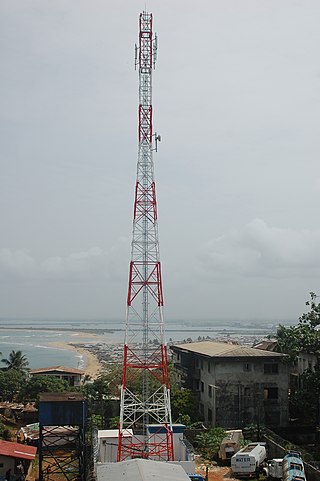
Mass media in Liberia include the press, radio, television, fixed and mobile telephones, and the Internet.

The Armed Forces of Liberia (AFL) are the armed forces of the Republic of Liberia. Tracing its origins to a militia that was formed by the first black colonists in what is now Liberia, it was founded as the Liberian Frontier Force in 1908, and retitled in 1956. For almost all of its history, the AFL has received considerable materiel and training assistance from the United States. For most of the 1941–89 period, training was largely provided by U.S. advisers, though this assistance has not prevented the same generally low levels of effectiveness common to most of the armed forces in the developing world.
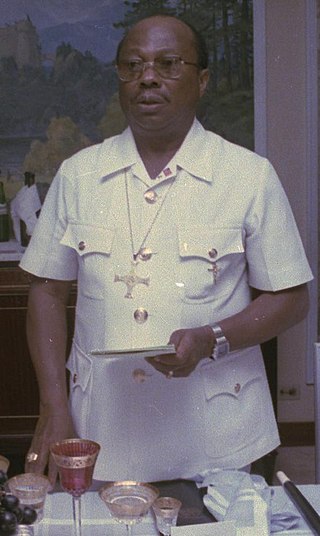
William Richard Tolbert Jr. was a Liberian politician who served as the 20th president of Liberia from 1971 until his assassination in 1980.

Monrovia is the capital city of the West African country of Liberia. Founded in 1822, it is located on Cape Mesurado on the Atlantic coast and as of the 2008 census had 1,010,970 residents, home to 29% of Liberia’s total population. As the nation's primate city, Monrovia is the country's economic, financial and cultural center; its economy is primarily centered on its harbor and its role as the seat of Liberian government.
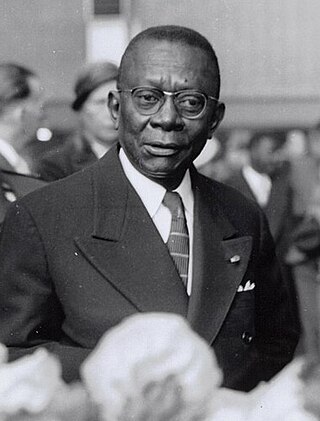
William Vacanarat Shadrach Tubman was a Liberian politician. He was the 19th president of Liberia and the longest-serving president in the country's history, serving from his election in 1944 until his death in 1971.
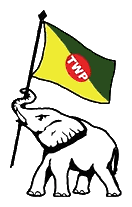
The True Whig Party (TWP), also known as the Liberian Whig Party (LWP), is the oldest political party in Liberia and one of the oldest parties in Africa. Founded in 1869 by primarily darker-skinned Americo-Liberians in rural areas, its historic rival was the Republican Party. Following the decline of the latter, it dominated Liberian politics from 1878 until 1980. The nation was virtually governed as a one-party state under the TWP, although opposition parties were never outlawed.

Montserrado County is a county in the northwestern portion of the West African nation of Liberia containing its national capital, Monrovia. One of 15 counties that comprise the first-level of administrative division in the nation, it has 17 sub political districts. As of the 2008 Census, it had a population of 1,118,241, making it the most populous county in Liberia. The area of the county measures 1,912.7 square kilometres (738.5 sq mi), the smallest in the country. Bensonville serves as the capital.

The music of Liberia uses many tribal beats and often one of the native dialects, or vernacular. Liberian music includes traditional Gbema music, as well as the popular genre Hipco.
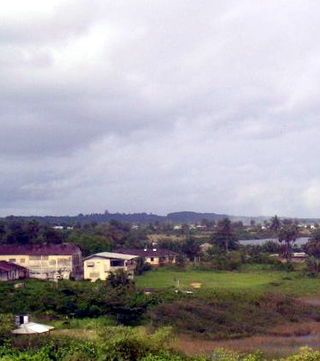
Harper, situated on Cape Palmas, is the capital of Maryland County in Liberia. It is a coastal town situated between the Atlantic Ocean and the Hoffman River. Harper is Liberia's 11th largest town, with a population of 17,837.
The Antoinette Tubman Stadium is a multi-purpose stadium located in Monrovia, Liberia. It is used mostly for football matches although it has also been used for music concerts, major church events, political rallies and Ebola treatment. It has a capacity of 10,000 spectators and is the oldest stadium in Liberia.
The National Museum of Liberia is a national museum in Monrovia, Liberia. Initially housed in the First Executive Mansion on Ashmun Street of the city which is now used as a library, it was established by an Act of the National Legislature in 1958 under the administration of Liberia's 18th President, Dr William V.S. Tubman. Partly funded by UNESCO, in coordination with the Department of Public instructions, its primary goal was to obtain, preserve and display cultural artefacts and other historical items which depict the country's heritage.
John F. Kennedy Medical Center is the national medical center of Liberia, located in the Sinkor district of Monrovia.

Antoinette Louise Padmore Tubman was the wife of the Liberian politician William S. Tubman and the First Lady of Liberia from 1948 to 1971.
A. Doris Banks Henries was an American educator and writer in Liberia, and Assistant Minister of Education during the Tolbert administration.
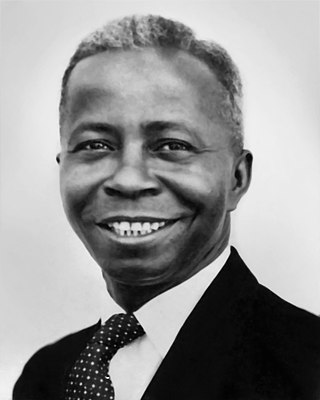
Edison Reginald Townsend was a Liberian journalist and statesman known for the establishment of Liberia's Information Services. He served as Secretary of Information and Cultural Affairs under President William Tubman, and as Minister of State for Presidential Affairs under President William Tolbert. In 1979 he was elected National Chairman of the True Whig Party. Following the 1980 Liberian coup d'état of President Tolbert on April 12, 1980, he and several other members of the Tolbert administration were put on trial and without due process executed by firing squad on April 22, 1980.
The following is a timeline of the history of the city of Monrovia, Liberia.

Liberia–Soviet relations were the bilateral relations between Liberia and Soviet Union. Contacts between the two countries were sporadic during the 1950s and 1960s, improved during the 1970s but became frosty in the 1980s.
Claude Albert Barnett was an American journalist, publisher, entrepreneur, philanthropist, civic activist, Pan-Africanist, and founder of the Associated Negro Press (ANP). He started the first international news agency for black newspapers. He was an advocate against segregation in the military and blood supply. He was an activist force in journalism. He promoted Pan-Africanism. The (ANP) documented the Civil Rights Movement in the United States of America, and struggles for independence in Africa. Associated Negro Press was a Pan-African news service. Claude Barnett, Robert S. Abbott, and John H. Johnson were three of the most influential African-American media entrepreneurs in the 20th century. They were based in Chicago, Illinois. Barnett is said to have advanced the role of the Black Press in press coverage, news sharing, advertising, public relations, and professionalism.

Didwho Welleh Twe was a Liberian politician. He became a representative in the Liberian legislature and a presidential candidate in the 1951 Liberian general election. A review of his life shows that he was an advocate of Liberian native rights and the first Liberian of full tribal background to officially and openly seek the Liberian presidency. Since 1847, the country was ruled by descendants of American former Black slaves known as Americo-Liberians until 1980. The descendants constitute less than ten percent of the population.












